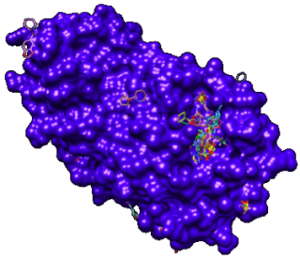Summary
The main protease (Mpro) in severe acute respiratory syndrome coronavirus 2 (SARS-CoV-2), the virus responsible for the coronavirus disease (COVID-19), has emerged as a promising drug target. The scientific community has produced a large number of crystallographic structures of the protease, which mediates viral replication and transcription. These structures report several fragments with varied chemotypes binding to different sites in Mpro. The main challenge at this stage is to effectively corroborate these valuable structural insights and expedite the search for any known drugs or natural products with properties similar to those fragments such that they can be rapidly translated for clinical testing against SARS-CoV-2. In this project, we build an artificial intelligence-based model using the available structural data of fragment-bound SARS-CoV-2 Mprocomplexes.Leveraging known drug-target interactions, our goal is to produce a machine learning algorithm capable of predicting potential drugs that can be repurposed for the treatment of COVID-19. We explore the potentials of small molecules, including drugs, natural products, and quantum dots to identify promising structures for inhibiting and/or detecting the SARS-CoV2 virus. Our results are expected to provide useful insights into the readily available therapeutic resources and help in the fight against the COVID-19 pandemic.
Related Content
Fabrication of Ultra Low Noise RF SQUID Amplifiers
A superconducting quantum interference device (SQUID) is an extremely sensitive magnetic field detector.
June 1, 2017

Quantum Information Processing with Molecular Lattices
The aim of the work is to develop theoretical tools to simulate and predict the behaviour of a one-dimensional chain of trapped dipolar molecules and to study the nature of entanglement as a design resource.
June 1, 2017

Scanning Tunneling Microscopy of Quantum Materials, Devices and Molecules
Summary This project advances our ability to characterize and study novel quantum materials, quantum devices, and even individual molecules at the atomic level. By combining Non-Contact Atomic Force Microscopy (NC-AFM), Scanning Tunneling Microscopy (STM) and scanning gate methods, we correlate spatial information with transport properties and can locally manipulate charge, spin and structural states. […]
January 28, 2019

Composite Superconductors for Improved Quantum Coherence
Summary Conventional superconductors have trouble performing well in magnetic fields required for electron spin resonance (ESR) – based quantum information processing applications. We can, however, use proximity engineering to select desired properties from different materials and combine them for improved superconducting performance in magnetic fields — an improvement that would have strong implications for […]
December 12, 2018


